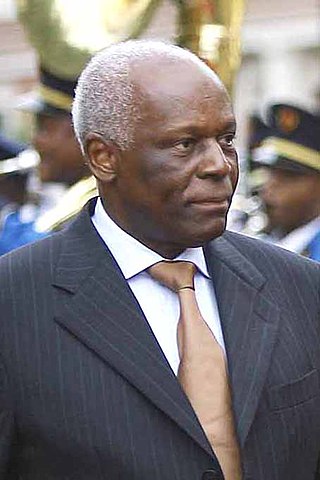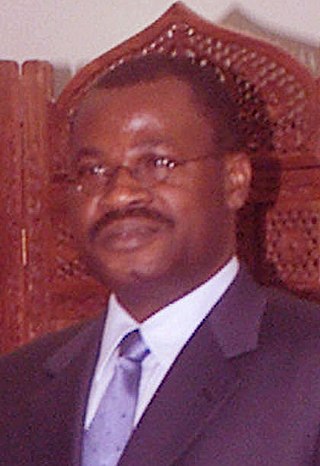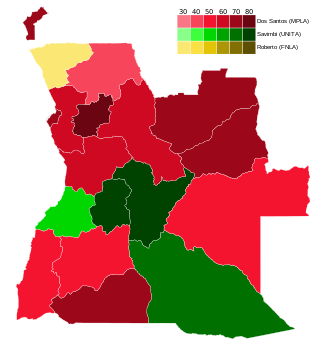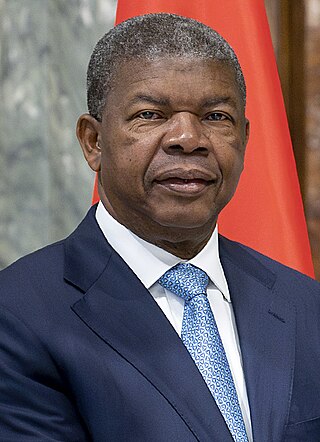
The current political regime in Angola is presidentialism, in which the President of the Republic is also head of state and government; it is advised by a Council of Ministers, which together with the President form the national executive power. Legislative power rests with the 220 parliamentarians elected to the National Assembly. The President of the Republic, together with the parliament, appoints the majority of the members of the two highest bodies of the judiciary, that is, the Constitutional Court and the Supreme Court. The judiciary is still made up of the Court of Auditors and the Supreme Military Court.

The president of Angola is both head of state and head of government in Angola. According to the constitution adopted in 2010, the post of prime minister is abolished; executive authority belongs to the president who has also a degree of legislative power, as he can govern by decree.

José Eduardo dos Santos was the president of Angola from 1979 to 2017. As president, dos Santos was also the commander-in-chief of the Angolan Armed Forces (FAA) and president of the People's Movement for the Liberation of Angola (MPLA), the party that has ruled Angola since it won independence in 1975. By the time he stepped down in 2017, he was the second-longest-serving president in Africa, surpassed only by Teodoro Obiang Nguema Mbasogo of Equatorial Guinea.

Fernando da Piedade Dias dos Santos, known as Nandó, is an Angolan politician who was the first vice president of Angola from February 2010 to September 2012. He was the prime minister of Angola from 2002 to 2008 and president of the National Assembly of Angola from 2008 to 2010. He has again served as president of the National Assembly from 2012 to 2022.

Elections in Angola take place within the framework of a multi-party democracy. The National Assembly is directly elected by voters, while the leader of the party or coalition with the most seats in the National Assembly automatically becomes President.

The National Assembly is the legislative branch of the government of Angola. Angola is a unicameral country so the National Assembly is the only legislative chamber at the national level. The People's Movement for the Liberation of Angola (MPLA) has held a majority in the Assembly since Angolan independence in 1975.

João Bernardo de Miranda is an Angolan politician who is currently the Ambassador of Angola in France. He was Minister of External Relations of Angola from January 1999 to October 2008 and the Governor of Bengo Province from 2009 to 2018.
Julião Mateus Paulo is an Angolan politician and former Secretary-General of the People's Movement for the Liberation of Angola (MPLA). He is widely known by his wartime nom de guerre, Dino Matrosse.

Parliamentary elections were held in Angola on 5 and 6 September 2008, as announced by President José Eduardo dos Santos on 27 December 2007. They were the first since the 1992 general elections, which had led to the outbreak of the second phase of the Angolan Civil War, which continued until 2002.

General elections were held in Angola on 29 and 30 September 1992 to elect a President and National Assembly, the first time free and multi-party elections had been held in the country. They followed the signing of the Bicesse Accord on 31 May 1991 in an attempt to end the 17-year-long civil war. Voter turnout was 91.3% for the parliamentary election and 91.2% for the presidential election.

Since its independence from Portugal in 1975, Angola has had three constitutions. The first came into force in 1975 as an "interim" measure; the second was approved in a 1992 referendum, and the third one was instituted in 2010.
General Francisco Higino Lopes Carneiro is currently a member of parliament for the MPLA in Angola. He is, along with fellow "top generals" João Maria de Sousa, Hélder Vieira Dias, Roberto Leal Monteiro, and Kundi Paihama, one of the military leaders holding top ministerial posts for the Popular Movement for the Liberation of Angola, the political party that has ruled Angola since it gained its independence from Portugal in 1975.

António Paulo Kassoma is an Angolan politician. He was named Prime Minister of Angola in September 2008 and remained in office until the new constitution replaced this function in February 2010. Kassoma then served as President of the National Assembly of Angola from 2010 to 2012. On August 27, 2016 Kassoma was named Party Secretary of the People's Movement for the Liberation of Angola.

The 2012 Angolan general election was held in Angola on 31 August 2012 to elect the President and National Assembly. These were the first elections after the new 2010 constitution was instituted. During campaigning, the opposition UNITA and its offshoot CASA-CE accused and criticised the government of corruption and called for greater transparency; this led to protests and arrests the day before the election.

Manuel Domingos Vicente is an Angolan politician who served as the vice president of Angola between September 2012 and September 2017. He was chief executive officer of Sonangol, Angola's state oil company, from 1999 to 2012, and he briefly served in the government as the minister of State for Economic Coordination in 2012. Vicente was the mastermind of a triumvirate alongside Leopoldino Fragoso do Nascimento and Manuel Hélder Vieira Dias Junior, who built a secret banking network Banco Africano de Investimentos to transfer millions of dollars out of Angola from 1996 onward. While the US Treasury sanctioned the latter two in 2020 for misappropriating funds for personal benefit, they did not sanction Vicente.

João Manuel Gonçalves Lourenço is an Angolan politician who has served as the 3rd president of Angola since 26 September 2017. Previously, he was Minister of Defence from 2014 to 2017. In September 2018, he became the Chairman of the People's Movement for the Liberation of Angola (MPLA), the ruling party. He was the party's Secretary-General from 1998 to 2003.

Presidential elections were held in São Tomé and Príncipe on 18 July 2021. As no presidential candidate received a majority of the vote, a second round was originally scheduled to be held on 8 August 2021. However, following an objection to the first-round result, the second round was postponed to 29 August 2021, and later postponed again to 5 September 2021.

General elections were held in Angola on 24 August 2022 to elect the President and National Assembly. Incumbent president João Lourenço was eligible for one more term. The MPLA was re-elected with a reduced majority, winning 124 seats with 51% of the vote. The main opposition party, UNITA won 90 seats with 44% of the vote. The Social Renewal Party (PRS), the National Liberation Front of Angola (FNLA) and the Humanist Party of Angola (PHA) each won two seats. The elections were the closest in Angolan history between the MPLA and UNITA.
Laurinda Jacinto Prazeres Monteiro Cardoso is an Angolan lawyer and jurist who has been President of the Constitutional Court since 2021.
Events in the year 2022 in Angola.

















